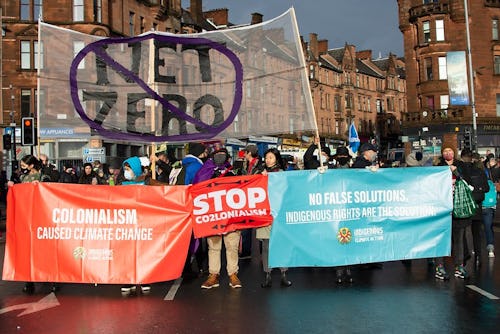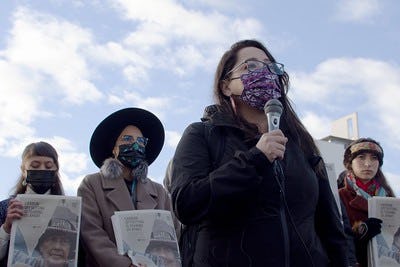
Our Streets is a column by writer and reporter Ray Levy Uyeda that highlights activists, artists, and organizers who are doing the work and reclaiming power for the people.
As the stakes of climate change worsen, and as the years remaining to truly halt the worst impacts of a crisis situation tick away, there is finally serious government interest in shifting away from fossil fuels. The problem that remains is how to go about it. Federal intervention usually comes via regulations on the economy and production, which are often met with outcry about jobs lost and government overreach. In recent years, however, there has been a new recognition that regulation isn’t the only path forward. Instead, global leaders can look to a longstanding source of climate knowledge: Indigenous people.
Indigenous people have access to millennia of generational knowledge of land stewardship — experience and understanding needed to address the planet’s threatened ecosystems. Every tribe maintains its own practices, whether that be practicing cultural burns that renew forest ecosystems and prevent wildfires or growing crops in a way to restore soil health. Yet policy is often designed without the input of Indigenous people, despite the fact that they face some of the most direct threats of climate change.
The problem with these proposed solutions, Indigenous Climate Action (ICA) argues, is that they don’t challenge colonial understandings of the environment, nor do they suggest climate solutions that get at the root causes of anthropomorphic climate change.
“It's very clear that these systems of oppression are still alive and well today [by] not including Indigenous folks at the table,” says Rebecca Sinclair, one of the main authors and researchers of Indigenous Climate Action’s Decolonizing Climate Policy report. “Canada and the U.S. have always had this paternalistic overview of Indigenous people,” Sinclair, nêhiyaw-iskwêw, originally from Barren Lands First Nation (Treaty 5) and a member of Little Saskatchewan First Nation, tells Mic.

ICA is an Indigenous-led organization based in Canada that develops solutions to the climate crisis that center Indigenous knowledge. The organization works on the ground with Indigenous communities and in partnership with fossil fuel divestment campaigns, and also conducts research on how public policy can meet the needs of Indigenous people. A new report put out by the ICA, called Decolonizing Climate Policy, outlines a path forward for developing policy solutions that center Indigenous voices, curb humans’ extractive relationship with the environment, and uphold Indigenous rights and sovereignty.
Sinclair explains that with that “paternalistic” view of Indigenous people comes a policy double talk that allows legislators to perform a superficial understanding of why Indigenous peoples and tribal nations must play a central role in restoring climate health, while preventing them from actually building solutions. It’s a perpetuation of a colonial relationship between state governments and tribal nations, ICA says. After all, colonialism, or the practice of gaining control over land and its people by way of genocide, exploitation, enslavement for the purpose of populating that land with settlers, is the origin story of the U.S. and Canada, where ICA is broadly based. Whereas colonial governments would seek to privatize, sell, and own land for the purpose of extracting resources like oil, gas, and water, Indigenous teachings support a reciprocal relationship with the land — one that’s built on respect rather than exploitation.
ICA’s first report on decolonizing climate policy hinges on this difference between settler-colonial priorities and Indigenous values. The organization outlines how colonialism and its co-conspirator of capitalism fueled climate change, saying that capitalistic economics demands unending growth and output, encouraging the destruction of delicate biomes without concern for consequences of carbon pollution.
If colonization is responsible for climate change, then decolonizing our understanding of the environment is paramount.
Climate change is a land-based issue, ICA argues in the report. Colonialism fundamentally began with the theft of land, then continued with its destruction. Therefore, in ICA’s view, the restoration of Indigenous sovereignty is directly related to mitigating changes to the environment that are responsible for massive flooding, wildfires, and warming weather, among numerous consequences.
And if colonization is responsible for climate change, then decolonizing our understanding of the environment is paramount. “Decolonizing is really uncovering that truth, dismantling systems of oppression, and identifying the systems of oppression,” Sinclair says. “What decolonizing means to me is, how are we dismantling the [systems] that prevent us from being involved in this conversation, and how are we identifying those linkages and that intersection into our worldview, and how the systems of oppression have benefited and torn our worldview apart?”
For example, Sinclair says, policy makers refuse to acknowledge that government climate proposals maintain a status quo motivated by capital. “It can’t be the economy versus Earth,” Sinclair says. But so often, economic progress is pitted against climate change. And because of that, individualistic, rather than systemic, changes are touted as climate solutions, obscuring the impact and responsibility of significant polluters.
Programs like encouraging recycling or driving electric vehicles force responsibility for the climate onto the individual. But these so-called solutions allow mega-polluting businesses to remain profitable without changing too much of their core operations, Sinclair says. Moreover, as ICA’s report says, these solutions only work for a certain imagined audience; electric vehicles, for example, simply aren’t feasible for Native and Indigenous people living on reservations who likely don’t have access to charging stations. There’s also the fact that the resources needed to operate electric vehicles are at present largely extracted from Native land, which can pollute water sources. ICA’s report challenges policymakers to recognize a simple truth: If climate solutions aren’t available to those most affected by climate change, then are they really solutions?
“If we live in respect and we live in reciprocity with the land, we can reap the benefits of this land too.”
Even when governments have supported seemingly large-scale policy solutions, Sinclair says that they continue colonial thinking and treat land as a tradeable, manageable product. Carbon offsets are an example of this, when an individual or business pays to remove greenhouse gases from the atmosphere. Sinclair explains that companies can even purchase land or pay landowners to capture greenhouse gases. Yet “the land that they're buying is not unclaimed. It’s home to Indigenous folks. It is sacred,” Sinclair says. “This is a scheming way for fossil fuel industry to abate their emissions and put the responsibility on the individual.” ICA’s report also finds that dams and hydroelectric dams, which are touted as an environmentally friendly means of energy production, actually increase toxic compounds in fish and mammals and release unhealthy carbon dioxide and methane gases.
Sometimes so-called “solutions” are only available to those who can afford them, another issue outlined in the report. Decolonizing climate policy mandates that elected officials take into account the economic disenfranchisement of Indigenous peoples. Research shows that while those who are poor and low-income are the least responsible for climate change, they also don’t have the ability that high-income people do to withstand the impacts of climate change.
To be clear, Sinclair says, “Indigenous folks aren’t anti-economy. There is a distinction of reciprocity and respect within the land. We can coexist and live on Earth, and that’s not my opinion. That is the teachings I've been given from elders and knowledge keepers, that if we live in respect and we live in reciprocity with the land, we can reap the benefits of this land too.”
A decolonized climate policy would take into consideration the trauma caused by past colonization and current forms of colonial harm, Sinclair says. Some of that harm is inflicted by erecting borders and splitting families and tribal nations in ways that served the U.S. and Canadian governments’ desire to buy, trade, and exploit land for the purposes of capital. “There's no real Canada or no real so-called ‘the United States of America'’ when we talk about climate,” Sinclair says.
But the collaborations between the two countries are real. Take the Line 3 pipeline reconstruction project in Minnesota, Sinclair says, which directly harms the climate by way of oil extraction and spills. It also harms people. Fossil fuel extraction typically demands the set-up of “man camps,” temporary housing composed mainly of white men who are working on the projects. Man camps have been linked to the epidemic of missing and murdered Indigenous women and relatives.
Indigenous-led solutions will help all people, Sinclair says. But the question for legislators is if they’ll realize it. Now that the ICA has laid out the problems of colonized climate policy, and the necessity of decolonizing how we shape climate action, Sinclair hopes that future reports outline what this looks like in practice. A shorthand for legislators to keep in mind when drafting policy, Sinclair says, is that “if they're not equitable, then they’re not solutions.”







